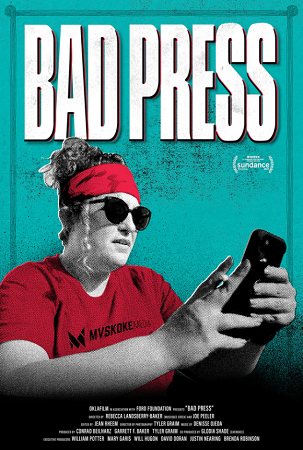
Bad Press 2023
Distributed by Collective Eye Films, 1315 SE 20th Ave. #3, Portland OR 97214; 971-236-2056
Produced by Conrad Beilharz, Garrett F. Baker, Tyler Graim, Rebecca Landsberry-Baker, and Joe Peeler
Directed by Rebecca Landsberry-Baker and Joe Peeler
Streaming, 98 mins
College - General Adult
Journalism; Native Peoples
Date Entered: 04/18/2024
Reviewed by Brian Falato, University of South Florida Tampa Campus LibraryThe American newspaper industry faces financial pressures from loss of advertising revenue and readership, resulting in reduced staffing and coverage at most papers and closure of some. But at least their right to publish what they want is protected by the First Amendment to the U.S. Constitution. That is, except at most of the papers published for members of the 574 federally recognized Indian tribes. The Muscogee (Creek) Nation of Oklahoma was one of five tribes that had laws protecting freedom of the press. Then that law was repealed. The video Bad Press looks at the struggles of the indigenous Muscogee press to operate under the new conditions and efforts to resuscitate freedom of the press.
As the video shows in archival headlines from the "Muscogee News," before freedom of the press was enacted by the tribe in 2015, coverage of Muscogee citizens and government was almost entirely positive. It's mentioned in the video that the reluctance to "air dirty laundry" was partly because any negative stories could be seen as evidence for the racist assumption that Indians weren't intelligent enough to govern themselves. (Each federally recognized tribe has its own sovereign government.) Of course, this view also protected those who were doing wrong.
Angel Ellis was one of the reporters who refused to follow the good news only approach. A blunt-spoken woman whose language would frequently be bleeped if the video were to air on public television, Ellis wrote about misbehavior by Muscogee officials, including embezzlement charges against tribal leaders. She was fired from the "Muscogee News" in 2011 for "insubordination." She went to work for another small paper and said she was let go there after a Muscogee official demanded her firing or else the tribe would pull all its advertising from the paper.
Ellis returned to the "Muscogee News" after the freedom of the press law was enacted, thinking she'd be protected in her reporting. But in 2018, the Muscogee tribal council repealed the law and put the paper under the control of the Secretary of the Nation and Commerce. All stories had to be approved by the Secretary and he could demand rewrites of stories he didn't like.
The video, whose production team includes Muscogee tribal members, looks at the efforts to get freedom of the press enacted as an amendment to the Muscogee Constitution, as well as the 2019 election for Principal Chief of the Muscogee.
There's plenty of tension to keep viewers engaged as we watch the course of these activities. It takes two attempts to get the constitutional amendment on the ballot for tribal voters to approve, and two elections for Principal Chief. (The Muscogee Supreme Court invalidated the first election after charges of vote fraud by one of the candidates.)
While the particulars in this documentary are of local interest, the issue of free press versus increased government control is of national importance. This video is recommended for both academic and public libraries.
Awards:Winner of the Best Feature Documentary, 2023 Riverrun Film Festival; Winner of the Best Feature Documentary, 2023 Santa Fe International Film Festival; Winner of the Best Feature Documentary, 2023 SCAD Film Festival
Published and licensed under the Creative Commons Attribution 4.0 license. Anyone can use these reviews, so long as they comply with the terms of the license.